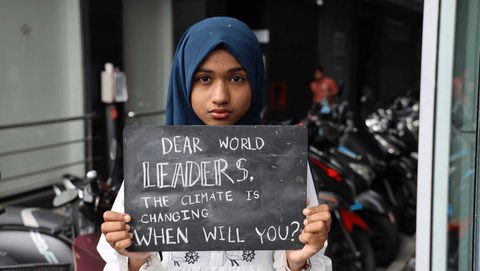
Twelve UNICEF Leading Minds Fellows (coming from Colombia, Venezuela, Kenya, Brazil, Albania, Bangladesh, Iceland, USA, UAE, Philippines, Uganda and Ghana), already deeply invested in a wide range of climate actions, worked together to answer this broad question.
A process giving the power to young people
For UNICEF this report is not just a pretext or an instrumentalization of young voices. It is anchored in the belief that young people should be more involved in decision making processes inherently shaping their lives, notably on climate change issues. As a living future generation, they have a say concerning the building of their conditions of existence.
Additionally, they revealed having promising insights and ideas, going beyond the usual ecological paradigms and enlightening major concerns.
"This report represents UNICEF's commitment to upholding children's right to participate in decisions that affect their futures, recognizing that the climate crisis is fundamentally a child rights crisis."
The team of 12 Young Foresight Fellows undertook an ambitious foresight program. Firstly they conducted a trend analysis and an horizon scanning exercise to identify the climate signals emerging globally. They sorted out 150 of them by analysing and prioritizing them together.
Then, in a convergence process, they grouped these various signals to deliver 26 key climate breakthroughs, related to five thematic areas. Delving more deeply in the issues, they used different tools -- Futures wheel (direct and indirect consequences), STEEP-V framework (Social, Technological, Economic, Environmental, Political, and Value factors) -- to detail their propositions.
Young people's political views on climate change
Here are the five themes and their related propositions:
Eco-literacy
- Formal education: climate curricula in schools
- Social media, peer-to-peer learning and storytelling on climate
- Digital media to fund conservation efforts
- Climate policy literacy
Equitable energy transitions
- Closing the funding gap for a just energy transition
- Alliances for a world beyond fossil fuels
- Country-specific energy transitions
- Concerns on carbon capture advancements
- Systemic shift: Resource extraction for renewable energy materials
Farzana, 26: Fair Energy Access for All "All children and youth around the world should have the opportunity to enjoy access to energy; and this should be done in a way that would not heavily commit their natural resources. Children, especially in Least Developed Countries, should not have their resources taken away.
Climate finance
- Equitable climate finance policies
- Debt cancellations
- Redirecting fossil fuel subsidies for climate
- Taxation of wealth and climate damages
- Climate budgeting
- Challenging development of carbon markets
Loss and damage
- Climate litigation
- Dedicated funds for loss and damage
- Climate risk insurance
- Measurement of non-economic damages
- Compensation for cultural damages
Nikka, 22: Prioritizing Youth in Climate Recovery "Breakthroughs in Loss and Damage will recognize the importance of prioritizing young people's well-being during climate disasters. This means funding will be allocated to the implementation of post-disaster activities or recovery plans aimed at providing long term support to help young people cope with the aftermath. Also, by doing so, we can ensure that young people are equipped with the necessary tools and guidance to be resilient in the wake of disasters"
Community-centric governance
- Legal personhood for non-human entities
- Community-driven legislation against pollution
- Decentralized governance mechanisms
- Regional environmental rights agreements
- Youth inclusion in climate governance
- Elevating children's rights
Catarina, 18: Youth- and Children-Responsive Governance "Children should not have to be the ones pushing for governmental change, because governments should understand their responsibilities and effectively put them into practice. Yet, because governments fail to do so, it is necessary that governance becomes equitable and accessible, as well as youth inclusive, because my generation will not have the same power to create change through policy in the future as governors have today and therefore should be included when it comes to speaking of our own future."
